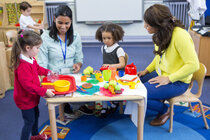Available Products
Number of topics: 6
By the end of this course learners will:
• Understand different theories relating to play, learning and development and schemas and how these link to current practice
• Recognise the types of schematic behaviour you may see in a child in your setting
• Understand how to support schematic behaviour with the enabling environment in your setting
• Understand how to support schematic behaviour with the positive relationships in your setting
• Gain ideas and knowledge about how to support parents with schematic behaviour in the home learning environment.
Who should complete this course?
Suitable for all practitioners working with young children. It covers the different theories relating to play, learning, development and schemas and how these link to practice.
Number of topics: 4
The aim of this training is to help early years practitioners understand what is meant by pedagogy and how to apply this to their own practice.
By the end of this course you will be able to:
- Explain the term pedagogy
- Describe some different pedagogical approaches
- Reflect on your own pedagogical approach and its impact on outcomes for children.
Number of topics: 4
Through research and best practice ideas, this course aims to help baby room leaders to provide the highest quality of care for under twos*.
*This course has been written to cover the 3 Home Nations; England, Scotland and Wales. Therefore some of the terms may differ from one nation to another and may not be familiar or used within that nation e.g. throughout the course we have used the term key person, this relates to the key worker in Scotland and Wales.
This course covers:
- Qualities of an effective leader
- How to lead quality practice within under twos provision
- What high-quality baby room practice is
- Hygge and mindfulness and how these concepts can support the well-being of staff and children within the baby room.
Number of topics: 3

This online course looks at how early years practitioners can respond sensitively to incidents of biting.
Key Topics include:
- The reasons children may bite;
- How to use observations as a key tool in identifying the underlying reasons for biting; using an ABC observation chart;
- Supporting and developing empathy in young children;
- Strategies early years practitioners can implement into their setting to minimise incidents of biting;
- Building parents confidence in dealing with biting incidents;
- Key tips for developing resources and
- How to work with parents to ensure a consistent approach to biting in the setting and at home.
Number of topics: 4
The aim of this course is to give learners an introduction in to what continuous provision is and how to effectively plan and enhance this. It will also look at the role of the adult when supporting children in the early years.
Learning Outcomes:
- Explain what continuous provision is be equipped to plan for it across the different age groups
- How to enhance this provision
- Identify the adults role in supporting children’s learning and development through continuous provision.
Number of topics: 3
The aim of this course is to help you understand the Ofsted terms 'Intent’, ‘Implementation’ and ‘Impact’ and how to apply these to your practice.
By the end of this course you will be able to:
- Understand what makes up the Ofsted inspection judgement on the quality of education
- Understand and use Ofsted terminology, in particular ‘intent’, ‘implementation’ and ‘impact’
- Explain your practice using the new terminology
- Assess your practice against Ofsted criteria.
Number of topics: 7

By the end of this course you will be able to:
- Outline how science in the early years manifests itself through play and exploration
- Describe how scientific opportunities can support children's development across all areas of learning
- Create sensory opportunities for younger children
- Design an environment that provides provocation for children to learn about science and the world around them.
Who should complete this course?
This course is suitable for individuals working with children in early years, e.g. nursery practitioners, pre-school practitioners, playgroup practitioners and childminders. The content is tailored to early years frameworks within the Home Nations.
Number of topics: 5
 What will I learn?
What will I learn?
This short online course will support practitioners with how boys learn. It covers how to plan your environment to ensure it excites and motivates both genders.
Boys learn differently to girls and early years practitioners can play a key part in reducing the achievement gap. The course includes lots of practical ideas and activities.
Key topics include:
• Why there is a need to focus on boys?
• Plan your environment to excite and motivate both genders
• The impact of a female dominated profession
• Gender differences and brain development
• Boys motivations and what motivates boys in your setting
• Ways to engage boys in literacy through play
Once you have added and paid for this item in your cart, you will receive an email giving you full information on how to access this online course.
Number of topics: 7

By the end of the course you will be able to:
- Describe what is meant by 'Outstanding Practice'
- Identify the key areas that contribute to outstanding provision
- Understand the importance of leadership in providing a clear vision and the steps to getting there
- Understand the role of evaluation and reflection in becoming and outstanding practitioner
- Describe how to evaluate and improve your early years environment
- Understand the importance of partnerships
- Identify the impact of practice on outcomes for children.
Who should complete this course?
This course is suitable for individuals working with children in early years, e.g. nursery practitioners, pre-school practitioners, playgroup practitioners and childminders. The content is tailored to early years frameworks within the Home Nations.
Number of topics: 4
The aims of this course are to improve early years practitioners’ knowledge and understanding of:
- Physical activity and its impact on the well-being of young children
- How to develop children’s physical literacy
- The role of the practitioner in delivering physical activity.
Number of topics: 9
By the end of the course you will be able to: 
- Define what we mean by behaviour and examine how behaviour is learnt
- Identify the key theories of behaviour and relate these to everyday practice
- Demonstrate the importance of the role of the adult in supporting and promoting positive behaviour
- Apply positive environments for children to play, learn and reach their full potential within
- Distinguish the behaviours children may exhibit at different stages and consider the possible reasons for that behaviour
- Interpret strategies to promote positive behaviour and deal with challenging behaviour
- Identify different strategies that can be used to support positive behaviour.
Who should complete this course?
This is suitable for anyone who works in early years who works with children in their setting, e.g. nursery practitioners, pre-school practitioners, playgroup practitioners and childminders.
Number of topics: 4
The aim of this course is to provide an overview of Ofsted's Quality of Education judgements and how this fits into your practice.
By the end of this course you will be able to:
- Identify the key changes to the Education Inspection Framework (EIF) 2019
- Describe the key elements of Quality of Education
- Create a Quality of Education Vision Statement.
Number of topics: 2
By the end of this course you will be able to:
- Identify key skills of being a successful teacher
- Select key elements of teaching in early years
- Recall key play theorists and their contribution to play
- Outline key elements to create a high quality early years environment
- Classify key elements of higher order thinking and learning questions
- Describe the role of the adult in supporting ZPD
- Explain the role of the early years practitioner in supporting high quality teaching and learning.
Number of topics: 3

By the end of the course you will be able to:
- Explain what is meant by the term ‘transition’ and summarise the theory and research behind this
- Assess key issues that children may face through times of change and identify solutions to fully support each unique child through times of transition
- Outline the key partners in the transition process, including parents and examine the importance of partnership working on consistency
- Investigate the effect the emotional and physical environment can have on a child’s well-being and identify strategies to support environmental change
- Discuss planning strategies needed to ensure support a smooth, effective the transition process which will benefit all children and key partners.
Number of topics: 5
 The United Nations Convention on the Rights of the Child (UNCRC) is social policy drawn up in 1989. It is an international agreement protecting the rights of children up to the age of 18.
The United Nations Convention on the Rights of the Child (UNCRC) is social policy drawn up in 1989. It is an international agreement protecting the rights of children up to the age of 18.
We will introduce all the UNCRC Articles that shape children’s rights. Then identify Articles that are specifically related to childcare and explore opportunities to promote and embed children’s rights into your everyday practice.
Who should complete this course?
This course is suitable for anyone that is studying a childcare qualification or working with children.
Number of topics: 4
This course focuses on theories and approaches towards young children.
















